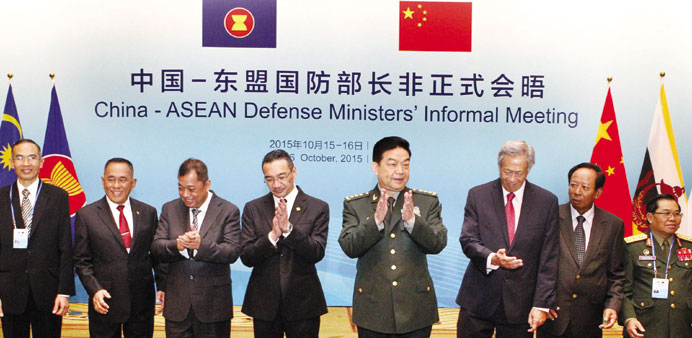Chinese Defence Minister Chang Wanquan (fourth right) claps next to his counterparts from Southeast Asian Nations (Asean) during the China-Asean Defence Ministers’ Informal Meeting in Beijing yesterday.
AFP/Beijing
China gathered defence officials and experts from across the Asia-Pacific in Beijing yesterday for a three-day security forum intended to boost the Asian giant’s influence on the global stage.
The Xiangshan, or Fragrant Hills, conference comes as tensions rise between Washington and Beijing, the region’s two largest economic and military powers, over the latter’s construction of artificial islands in disputed South China Sea waters.
US officials have signalled they may soon send ships by the islands, challenging Chinese sovereignty claims in a strategically crucial area that hosts vital shipping lanes — and Beijing has said it would “firmly oppose” such a move.
Five other countries in the region have rival claims to parts of the South China Sea — four of them members of the Association of Southeast Asian Nations (Asean)—and the disputes have sometimes spilled over into confrontations as vessels from the competing countries spar over fishing grounds and resource extraction. Beijing offered to hold joint military exercises with Asean members next year in the South China Sea, the defence ministry said on its official Sina Weibo, a Chinese version of Twitter. China already participates in military drills with several of its Southeast Asian neighbours.
The conference, the sixth of its kind, will be attended by 60 official delegations and 130 scholars, according to organisers. It is part of China’s broader effort to increase its international influence, which has also seen the creation of the multibn-dollar Asian Infrastructure Investment Bank.
The event will give Beijing “a louder voice”, according to a comment piece in the state-run China Daily newspaper, which added that it will help correct characterisations of China as “aggressive”.
The conference is seen as a potential competitor to Singapore’s showpiece Shangri-La Dialogue, which attracts top international military officials and experts to the city-state each spring.
In the past, that gathering has served as a forum for Western officials to dress Beijing down on its behaviour in the South China Sea, something less likely to occur on home turf. The Xiangshan meeting followed an informal gathering of defence ministers from the 10-member Asean bloc in the Chinese capital yesterday.
The group includes Brunei, Malaysia, the Philippines and Vietnam, all of which have rival South China Sea claims, as does non-Asean member Taiwan.
Vietnam has repeatedly accused China of ramming its fishing boats as they ply local waters. The Philippines has taken its dispute to a UN tribunal, infuriating Beijing.
Indonesia’s Defence Minister Ryamizard Ryacudu proposed joint “peace patrols” between China and Asean countries in a meeting with his Chinese counterpart on the sidelines of the gatherings, according to Jakarta’s state-run news agency Antara.
“If the countries who have interests in the South China Sea can calm tensions and are able to manage the conflict, there’s no need to involve other parties in resolving the dispute,” he was cited as saying. Asean has for years called on China to negotiate a Code of Conduct for the region, a binding set of rules aimed at preventing actions that lead to conflict.
Beijing has agreed to engage in “consultations” on the issue, although not full negotiations.
Several Asean defence ministers stayed on in Beijing for the Xiangshan forum, including Vietnam’s military chief.
The gathering’s headline speaker is Hun Sen, the prime minister of Cambodia, which has close relations with China. It is not a claimant in the South China Sea and has backed Beijing’s stance that Asean should stay out of the dispute. Addressing the question of China’s rising assertiveness in the region, Hun said that the country has been strengthening its military forces “in order to ensure its sovereignty and integrity”.
“It’s not a threat for the region or any country. I believe that. I’m confident of this.”
Tensions in the South China Sea, he said, should be solved through “the existing China-Asean framework” especially “direct discussion among parties,” a position long championed by China, but not the US, which favours a multilateral approach.

